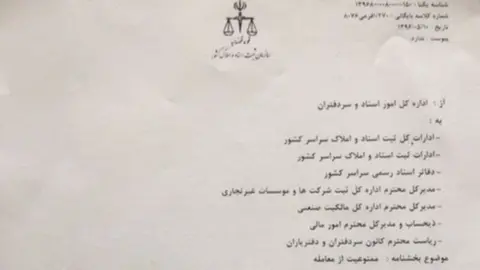UN urges Iran to stop harassing BBC Persian staff
A United Nations expert has urged Iran's government to stop harassing BBC Persian staff and their families.
David Kaye, the special rapporteur on freedom of opinion and expression, confirmed he had received a complaint from the BBC about their treatment.
It came after Iran initiated a criminal investigation into 150 BBC staff, former staff and contributors for "conspiracy against national security".
That means they cannot inherit family assets and prevents them and their families from selling property or cars.
BBC director general Tony Hall said Iran's action was "an unprecedented collective punishment of journalists" and against fundamental human rights.
BBC Persian broadcasts news from London on TV, radio and online. It reaches an estimated audience of 18 million every week despite being banned in Iran.

In a statement issued on Wednesday, the BBC said its BBC Persian staff and people associated with them had been subjected to a "sustained campaign of harassment and persecution" since the disputed 2009 presidential election, when the Iranian government accused foreign powers of interference. Examples it cited included:
- The sister of a journalist was held in Evin prison for 17 days and forced to plead with the journalist via Skype to stop working for the BBC or spy on colleagues
- Many elderly parents of BBC staff have been interrogated, including being questioned late at night
- BBC staff not being able to visit their dying parents for fear of imprisonment or being prevented from leaving Iran
- Reputations of staff attacked in the press and on social media with false and defamatory allegations including claims of sexual impropriety or sexual acts which are illegal in Iran, including those which attract the death penalty
The BBC complaint to the UN cites what it describes as numerous severe breaches of Iranian obligations under various international treaties to which it is signatory.

'Darkest period of our lives'
By Rana Rahimpour, BBC Persian
In November 2013, my father's passport was confiscated when he was about to board a flight from Tehran to London to join my mother ahead of the birth of my first child. My mother's passport was confiscated upon her return to Iran two weeks later.
It took three months before we found out how long the travel ban was going to last. My parents spent many days in the courthouse, trying to get an answer to no avail. It was only after my mother passed out at the gates that the judge's secretary felt sorry for them and arranged a meeting.
The judge told my father that my work as a journalist for the BBC was the reason why my parents were banned from leaving Iran. He added that, as my parents, they had the power to stop me - which they obviously did not.
The travel ban was lifted a year later. But it took a long time to recover from the darkest period of our lives.

"This is an unprecedented collective punishment of journalists who are simply doing their jobs. This is not just a campaign against BBC Persian staff but against fundamental human rights, and the BBC calls on the government of Iran to end this legal action immediately," Lord Hall said.
"The BBC, on behalf of its staff, will use all available legal avenues to challenge this order and we call on the international community to use their own influence in Iran to persuade the authorities that this completely unacceptable treatment must end."
Mr Kaye later told reporters in New York that he was aware of the BBC's complaint and that he would discuss the allegations with Iranian officials.
"We urge the government of Iran to stop harassing the employees and families of employees of the BBC," he said.
